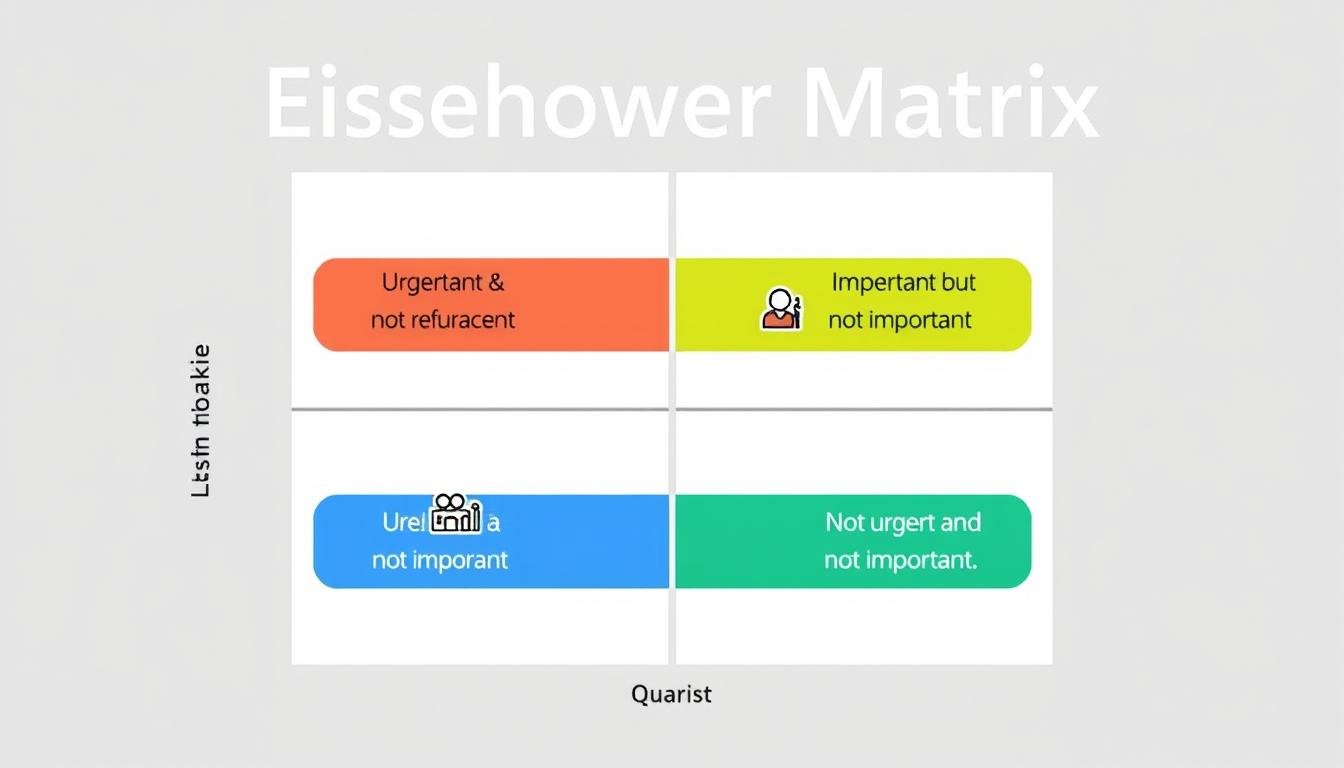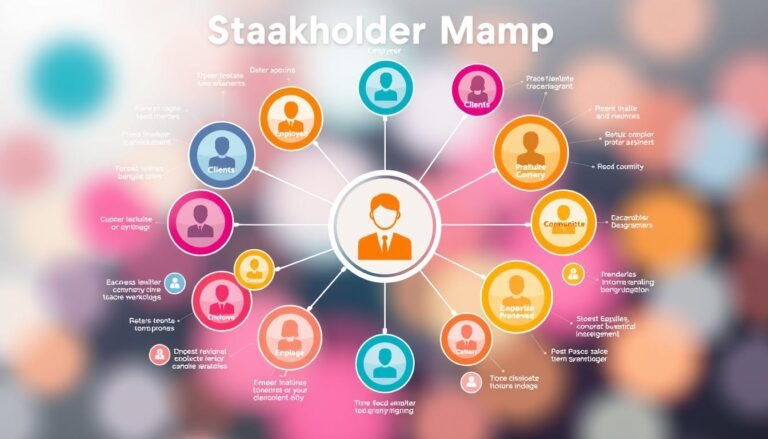The Eisenhower Matrix: Boost Your Productivity
Ever wondered why some people do more in a day than others, even with the same amount of time? It’s all about managing time well and knowing what to do first. The Eisenhower Matrix is a tool that helps you sort tasks by how urgent and important they are. It makes you more productive and helps you decide where to spend your time better.
This article will show you how the Eisenhower Matrix works and how it can change how you do daily tasks. It will help you work more efficiently.
Key Takeaways
- The Eisenhower Matrix categorizes tasks into four distinct quadrants.
- Limiting tasks to 10 per quadrant helps maintain focus and prevent overwhelm.
- Focus Bear enhances productivity by restricting non-essential distractions.
- Visual aids like color-coding can significantly improve task prioritization.
- Procrastination is mitigated by breaking tasks into smaller, actionable steps.
- Developing consistent routines can streamline productivity goals.
Understanding the Eisenhower Matrix
The Eisenhower Matrix is a key tool for boosting productivity and efficiency. It sorts tasks into four areas based on urgency and importance. This helps people focus on what’s really important. It shows that not all tasks are equal and helps people use their time better.
Definition and Purpose
The Eisenhower Matrix breaks tasks into four parts to help make quick decisions. About 60% of work time is spent on updates and follow-ups. The matrix makes these tasks more efficient.
Using colors like green, yellow, blue, and red helps see priorities clearly. Keeping tasks in each quadrant to ten helps keep things clear. This makes it easier to know what to focus on first.
Historical Background
This matrix is named after Dwight D. Eisenhower, the 34th U.S. President. He talked about urgent vs. important tasks in a 1954 speech. Stephen Covey made it famous in his book, “The 7 Habits of Highly Effective People.”
Thanks to Covey, many changed how they manage their tasks. They now focus on what really helps them reach their goals.
The Four Quadrants of the Eisenhower Matrix
The Eisenhower Matrix is a key prioritization method. It splits tasks into four areas based on urgency and importance. This helps people focus on what’s most important, boosting productivity. It’s vital to know each quadrant for better time management.
Quadrant 1: Urgent and Important
Tasks here need quick action and are crucial for reaching goals. They’re often called “fire drills” because ignoring them can lead to big problems. Examples include meeting deadlines, handling urgent client needs, and solving crises.
Quadrant 2: Not Urgent but Important
This area covers tasks vital for success over time but aren’t time-sensitive. It includes planning for the future, growing personally, and building relationships. Focusing on these areas leads to growth and reaching long-term goals, making them key in time management tools.
Quadrant 3: Urgent but Not Important
Tasks in this quadrant seem urgent but don’t help much in the long run. Examples are dealing with non-essential emails or attending routine meetings. By passing these tasks off, people can focus more on important work, boosting productivity and reducing distractions.
Quadrant 4: Not Urgent and Not Important
This quadrant has activities that add no value and are often seen as a waste of time. It’s best to cut down or avoid these tasks to make room for more important work. Being aware of these helps in focusing on what really matters in the urgent important matrix.
| Quadrant | Description | Examples |
|---|---|---|
| 1: Urgent and Important | Tasks requiring immediate action | Client emergencies, deadline-driven projects |
| 2: Not Urgent but Important | Long-term goals without immediate deadlines | Strategic planning, skill development |
| 3: Urgent but Not Important | Pressing tasks that lack significant impact | Unimportant emails, low-priority meetings |
| 4: Not Urgent and Not Important | Time-wasting activities | Social media browsing, trivial tasks |
How to Implement the Eisenhower Matrix Effectively
Using the Eisenhower Matrix can make you more efficient in both work and personal life. It helps you sort tasks and use your time better. Here’s a simple guide on how to use the matrix and prioritize tasks.
Step-by-Step Guide
To begin with the Eisenhower Matrix, follow these steps:
- Make a detailed list of all tasks you must do.
- Look at each task and see if it’s urgent and important. Put them into one of the four areas:
- Quadrant 1: Urgent and Important (Do)
- Quadrant 2: Important but Not Urgent (Schedule)
- Quadrant 3: Urgent but Not Important (Delegate)
- Quadrant 4: Not Urgent and Not Important (Delete)
Prioritization Strategies
Using smart prioritization with the Eisenhower Matrix can make your work smoother:
- Keep each quadrant to about ten tasks to stay focused and clear.
- Use colors to show how urgent and important tasks are, making it easier to see what’s most important.
- Check the matrix often to move tasks around based on their new urgency and importance, keeping it in line with your goals.
- This keeps big problems from becoming emergencies because they were ignored.
The Benefits of Using The Eisenhower Matrix
The Eisenhower Matrix is a productivity framework that helps manage tasks well. It puts tasks into four clear groups. This makes it easy to see what needs quick action and what can wait.
This method boosts efficiency and helps organize time better.
Enhanced Productivity
Using this time management tool, people focus on tasks that are both urgent and important. This way, time and resources are used wisely. It leads to doing more in less time.
Stress Reduction
The Eisenhower Matrix makes stress go down by clearly showing which tasks are urgent and important. Knowing what needs quick action helps avoid feeling overwhelmed. As tasks get sorted and done, people find their work easier to handle.
Improved Decision-Making
This decision-making tool helps make better choices about what to do. It gives clear guidance, letting people focus on their main goals. By focusing on what’s really important, people can work more effectively.
| Quadrant | Description | Examples |
|---|---|---|
| 1: Urgent and Important | Tasks that require immediate attention | Meeting deadlines, handling emergencies |
| 2: Not Urgent but Important | Tasks that contribute to long-term goals | Setting career aspirations, personal development |
| 3: Urgent but Not Important | Tasks that can be delegated | Daily chores, responding to emails |
| 4: Not Urgent and Not Important | Tasks that offer little to no value | Browsing social media, watching TV |
Conclusion
The Eisenhower Matrix is a key tool for getting things done. It helps people and teams focus on what’s urgent and important. It puts tasks into four groups: Urgent and Important, Important but Not Urgent, Urgent but Not Important, and Neither Urgent nor Important.
This tool makes deciding what to do easier and helps keep your focus sharp. By using it, you can become more productive and less stressed. It’s good to keep your task list short, with no more than five or seven items in each group.
Using colors to highlight tasks can also make managing them better. It’s important to balance work and personal life for a better balance. This tool helps with that.
Adding the Eisenhower Matrix to your daily routine can make managing tasks better. It helps you adapt and improve how you prioritize tasks. As tools for productivity change, using this matrix can help you reach your goals. It leads to a better way of handling tasks and time.
Source Links
- What is the Eisenhower Matrix and how can it boost your productivity?
- The Eisenhower Matrix: Time and Task Management Made Simple – Luxafor
- The Eisenhower Matrix: How to Prioritize Your To-Do List [2024] • Asana
- Avoid the "Urgency Trap" with the Eisenhower Matrix
- The Eisenhower Matrix: Prioritize Your Time on What Matters Most – Knock Down Silos by Slab
- What Is the Eisenhower Matrix? Definition, Example & FAQ
- Mastering the Eisenhower Matrix: Prioritize Like a Pro with the Right
- Eisenhower Matrix
- How to optimize the Eisenhower Matrix for maximum potential
- What is the Eisenhower Matrix?
- Eisenhower Matrix – Prioritize and Manage Time Better
- The Benefits of Using the Eisenhower Matrix
- The Eisenhower Matrix: Time and Task Management Prioritization
- Eisenhower Matrix » Definition, examples & templates
- Eisenhower Matrix







